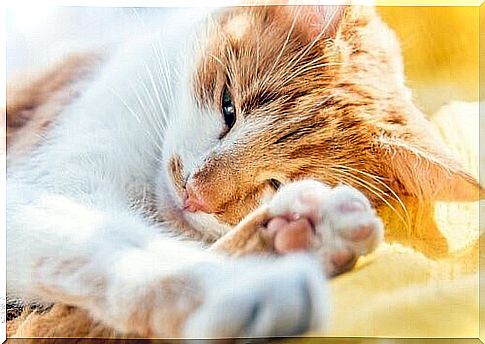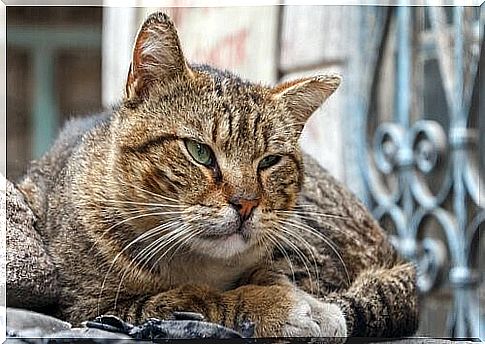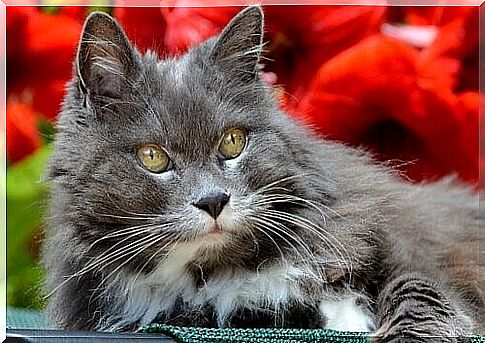Elderly Dementia In Cats: Symptoms And Treatment

When a cat has senile dementia, the condition of their brain deteriorates, making them more difficult to understand their surroundings and to remember things.
Over the years, pets experience changes in their behavior and health. Elderly dementia in cats occurs in older animals and reduces their understanding of the environment. In this article we will tell you more about this condition.
What is senile dementia in cats?
Also known as cognitive dysfunction in cats, senile dementia is a condition that primarily affects cats over the age of 15, although it can occur earlier (from the age of 10).
The cat’s ability to learn and understand things is affected by deterioration in its brain. Since this disorder affects the animal’s quality of life, it is important to learn about it and what to do about it.
Some of the changes cats experience are related to their behavior. It is a fallacy that senile dementia causes cats to become more aggressive. The disease has a particularly strong influence on their mental abilities.
The cats begin to act more slowly or can no longer do certain things they have learned, such as relieving themselves in the litter box.
Symptoms of senile dementia in cats
It is obvious that an older cat is nothing like a young kitten. As a cat gets older, its behavior and even some aspects of its personality change significantly. Some of the signs that indicate senile dementia in cats include:
1. Confusion and disorientation
This is the most common symptom. The animal might walk strangely, move its head to one side, or stay in one place for several minutes. The cat could be walking around the house looking for something, or it could no longer find its bowl and litter box, even though everything is in its usual place.

2. Changes in their personal hygiene
A sign that a cat is healthy is when it is constantly grooming and looking clean. If something is wrong with the animal, it will likely stop cleaning.
The same thing happens when our pet is older because it “forgets” to groom itself. Then you may find that it’s dirtier than normal.
3. Changed behavior
Elderly dementia changes cats’ habits and even their personalities. Your cat may be demanding more attention than before and may want to be petted and hugged more often. Or the opposite can be the case: it could become grumpier and more dismissive.
In addition, your cat may sleep a lot more, especially at night. Keep in mind that an older cat can rest between 16 and 18 hours a day and lose interest in what surrounds them, including food or toys.
Elderly dementia also causes cats to meow unexpectedly and loudly at night. They are looking for company and love. They can suffer greatly if left alone and when their owners come home they will not leave their side.

Elderly dementia in cats: treatment and care
First of all, you should know that the passage of time affects all living things in one way or another, and that there is no “cure” for senile dementia in cats. What we can do is delay or relieve symptoms.
Your vet may direct you to pharmacological treatment that will stop cognitive decline but not completely eliminate it.
What we can achieve is the best possible care for the animal in its last years. We can take care of the animal even more than before. Here are some useful recommendations:
- Do not move objects (neither objects nor furniture).
- Pay attention to hygiene (wipe your cat with a damp cloth to clean its fur).
- Play with her calmly and patiently.
- Place ramps around the house to make it easier for her to move around the house.
- Provide them with the nutrition they need in old age.
In particular, we recommend that you give your older pet a lot of love and attention. Remember that love from their owners is what our pets need to be happy.
Do not leave your cat alone for too long, and if this is not possible, you should give her a lot of attention when you get home.









